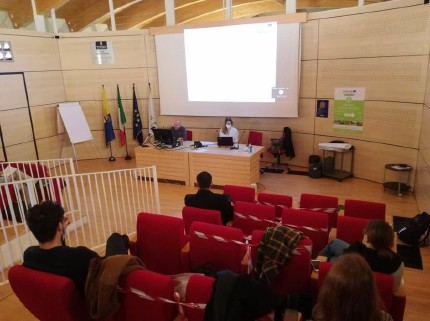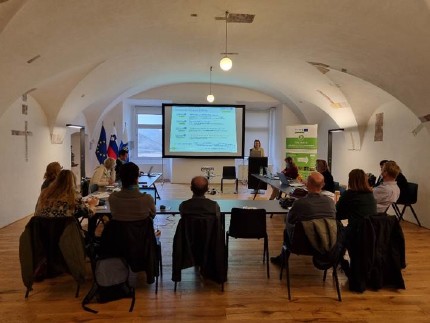Applicability testing of the Toolbox
From the beginning of the TEACHER-CE project it was recognised that the development of a useful Toolbox for the adaptation of water management to the challenges of climate change can only be realised when the people who should use it in the future are involved from the start. Already at the start-up workshops we exchanged ideas and expectations, discussed with them the main challenges in their daily operations and involved them in further developments of the project outputs.
In order to assure that the design of the Toolbox was supervised and guided by the key end users, a special Focus Group was established consisting of Associated Partners and further key end users of all partner countries. Together with the partners they tested the beta-version of the Toolbox this summer. Their input helped us to further develop and improve various parts of the tool, which was then finally ready to be tested by a wider set of stakeholders in October and November of this year.
Inclusion of the stakeholders in the various stages of Toolbox development has advantages for both sides:
- The partners gain insights from stakeholders of different backgrounds, widening the knowledge base for both thematic and technical issues of the Toolbox, improving functionality and usability of the same.
- The Stakeholders can make sure that their specific issues are included in the Toolbox and get a tool tailor-made for their daily work to help cope with climate change related issues.
What was discussed?
To introduce the stakeholders to the project, the Toolbox and the latest developments, various presentations were given, including a guided tour through the Toolbox and its functions. There were three basic questions that needed to be answered.
- Does the Toolbox reach its goal as an identification platform for issues and measures and a discussion platform for stakeholders?
- What are the limitations? What stops stakeholders from providing information?
- What is the user experience? Do stakeholders know how to use the toolbox and does it meet user expectations?
In general the feedback was very positive. The stakeholders were of the opinion that the Toolbox is well structured, useable and user friendly. They liked it in particular as a handy information tool on climate indicators, as an overview of the issues in a given area and for the measures suggested to deal with these issues. However, some stakeholders also raised concern about the usability of the Toolbox, especially regarding the complexity of some of the tools. For example, the ranking of measures with the AHP (Analytic Hierarchy Process) method is very complex. Therefore, it was suggested to mark it as an experts’ tool.
In addition to the Toolbox itself, its connection to strategies in the field of water management and needs for improvements were discussed.
The Toolbox as a Decision Support Tool
In general decision support systems and tools are a valuable instrument for stakeholders working in public administration. Nevertheless, stakeholders do not have the resources to deal with complex tools. Discussions have shown that instruments like our Toolbox must be prepared in such a way that they support the practical side of adaptation tasks as efficiently as possible. The input from the stakeholders for the improvement of our Toolbox has shown that the inclusion of examples of good practices in order to ensure knowledge shared among stakeholders would be helpful to support them in their approach to climate change adaptation. This encourages communication among experts with different expertise to express their view on identified issues and improve recommendations.
Data Protection and Maintenance of the Toolbox
In many of the workshops the topic of data protection and the further maintenance of the Toolbox was discussed at length, showing its importance for stakeholders of various backgrounds.
The Toolbox has the potential to be used widely, not only among institutions, but also among general public who could report flood events themselves (e.g. information on houses that have been flooded is important for flood safety planning). However, to use the Toolbox as a discussion platform by different institutional level, a certain degree of confidentiality needs to be guaranteed, meaning that “normal citizens” should not have access to data uploaded by institutions, or at least not to every level of information.
Stakeholders appreciated the use of usernames, which would also be necessary in case of setting up a web forum system for commenting on identified issues.
Another concern was how the Toolbox will be supported after the end of the TEACHER-CE project.
Strategies
The stakeholders discussed which role strategies can have for successful adaptation in the field of water management.
In general, knowledge of existing strategies varied between the groups of stakeholders. Many stakeholders do not feel included when new strategies are formed, therefore the establishment of e.g. water council, composed of various experts, at river basin level, would be welcomed. A water council would act as a connection between national and local level.
It was acknowledged that there is lack of cooperation and communication between national and local level, when forming the strategies and applying the measures. An integrated approach bringing different fields of action together was considered as a desirable concept. It was also pointed out that measures are implemented at the local level, so the establishment of concrete concepts at the local level is considered important. However, there is a lack of human and financial resources for the development and implementation of such a concept.
Next steps
The generally positive feedback about the Toolbox was very welcomed. Still, some parts of the Toolbox need further improvement. The input from the stakeholders will now be evaluated and integrated in the final development phase of the project.
Project partners are also working on concepts for the improvement of existing strategies and policies in the water management sector. A strategy for integrated and participatory water and land use management considering climate change is being developed based on inputs from the stakeholders and expert knowledge from the partnership.
The final version of the Toolbox and the Strategy will be presented at our Final Conference in February.

|

|
